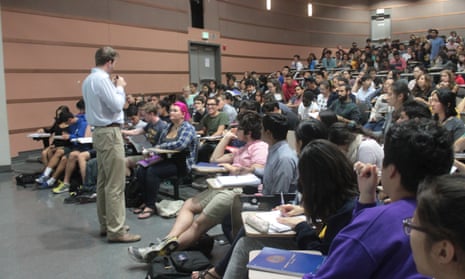Pearson has reported a pre-tax loss of £2.6bn for 2016, the biggest in its history, after a slump at its US education operation.
The world’s largest education publisher, which in January saw almost £2bn wiped from its stock market value after issuing its fifth profit warning in two years, reported the record loss after taking a £2.55bn non-cash charge for “impairment of goodwill reflecting trading pressures” in its North American businesses.
A spokesman said the charge related mainly to historic acquisitions of Simon & Schuster Education and National Computer Systems, purchased in 1998 and 2000 respectively, as a “necessary consequence” of the lower profit expectations announced last month.
In January, the company slashed its profit forecast for this year by £180m and scrapped its target of £800m for next year. It also announced that it planned to sell its stake in the world’s largest book publisher, Penguin Random House, to strengthen its balance sheet.
The profit warning was prompted by the collapse of its US higher education business, which is struggling with a decline in textbook sales and the transition to digital learning. The US business accounts for two-thirds of Pearson’s revenues and profits.
The news earlier this year led to Pearson’s biggest ever one-day share price fall and prompted speculation that John Fallon, the chief executive, may be forced out of the company.
“I am a shareholder and I share the frustration of all shareholders,” said Fallon, when asked whether he should continue to lead the company. “My conversations with the chairman and the board are all about ensuring we lead Pearson through this transition as quick as possible. My job is to get on and stay very focused.”
On Friday, Pearson said that after stripping out the multibillion-dollar impairment charge adjusted operating profits were down by 21% to £635m. Revenues fell by 8% to £4.5bn.
The company has advised that operating profits would be £570m-£630m in 2017 and that it was “rebasing” its dividend policy.
Fallon said: “2016 was a challenging year for Pearson, but we remain the global leader in education, with a strong market position. Education like every other sector and sphere of life is going through this digital transformation. There is going to be a big winner in the transformation in education. We are absolutely determined to make Pearson that winner.”
The company said it was looking to sell its English test preparation business in China, Global Education, which it acquired in 2011 for $155m (£123m), and to find a strategic partner for the English-language learning business Wall Street English, which it acquired in 2009 for $145m.
The two businesses contributed £253m of revenues and £3m of adjusted operating income last year.
Pearson has already announced that it intends to sell its 47% stake in Penguin Random House, which publishes titles ranging from Fifty Shades of Grey and The Girl on the Train to Nigella Lawson and Jamie Oliver’s recipe books, in a deal that is likely to net the company more than £1.2bn.
Pearson’s 47% share of PRH netted it £129m of the publisher’s total profits last year, up 23% on 2015, as revenues dipped after a strong 2015.
Investors had been prepared for the poor annual results and Pearson’s share price dropped by less than 2% in early trading. The main concern for many had been the financial leverage of the group as profits fell and net debt rose.
Net debt almost doubled from £654m to £1.09bn, which the company blamed on the strengthening of the US dollar against the pound and restructuring costs, much lower than the analyst consensus of £1.3bn.
“The results show that the group’s financial position is much more robust than expected/feared by investors,” said the Citi analyst Thomas Singlehurst. “There are of course niggles. Even if current trading is in line, the outlook is hardly stellar and the impairment of goodwill is unwelcome. But having had a tough start to the year we expect these results will provide a lot of relief.”
Despite the poor performance of the company, senior executives will still enjoy splitting £55m in bonus and incentive payments as Pearson reached some goals including profit targets.
In 2015 no incentive pay was awarded and this year the company is setting aside £110m for payouts “to ensure our workforce is properly incentivised”.
The company made more than £350m in cost savings last year, cutting 4,000 jobs, 10% of its global workforce.
Staff will be braced for further losses this year with Pearson saying that it intends to “take further action to improve the overall efficiency of the company”.
Pearson was founded in 1844 as a construction company which switched to the publishing sector in the 1920s. A spokesman for the company, which listed on the London Stock Exchange in 1969, said he could not be definitive but believed it was the largest loss Pearson has ever reported.

Comments (…)
Sign in or create your Guardian account to join the discussion